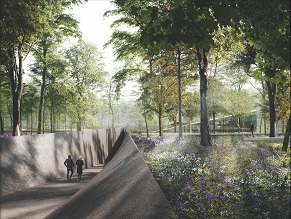|
Euroasian Jewish News

Throw the old Jewish cementary -- to the memorial, accroding to the plan
|
Austrian firm chosen to work for the Russian money on the Babi Yar Holocaust memorial
12.09.2019, Ukraine Efforts to build a memorial and research center at the Babi Yar Holocaust massacre site in the Ukrainian capital of Kyiv appeared to progress significantly this week with the announcement that an Austrian firm had won an architectural competition to design the structure, which organizers hope to open in 2023.
More than 30,000 Jews were murdered by the Nazis and local collaborators at the site over a period of two days in 1941.
Querkraft Architekten was chosen from among five finalists to design the “next-generation memorial” being planned by the Babyn Yar Holocaust Memorial Center (BYHMC), an initiative whose supporters include World Jewish Congress president Ronald Lauder, former Jewish Agency chairman Natan Sharansky, Kyiv Mayor Vitali Klitschko and a number of a number of wealthy Russian businessmen. A declaration of intent to create the center was signed in Kyiv in the presence of then-president Petro Poroshenko in September 2016.
The winning design features a ramp resembling the ravine in which the massacre took place, leading to an exhibition space 20 meters (65 feet) underground directely on the territory of the old Jewish cementery that represents “society’s initially invisible, yet incessant plunging in the darkness of violence.”
“The abstract and low-key architecture forms a unique interpretation of the competition task for realizing the Babi Yar Holocaust Memorial Center,” said Professor Rainer Mahlamäki, a member of the architectural jury of the competition. “The proposal provides an excellent starting point to develop the Babi Yar Memorial into an internationally important center.”
Prime Minister Benjamin Netanyahu appeared to endorse the project during a state visit to Ukraine last month, saying that he and Ukraine’s recently elected Jewish president, Volodymyr Zelensky, had spoken with Sharansky “about the possibility of establishing a heritage center here that would be a symbol to all of humanity.”
“I thank you President Zelensky, and I also thank the Ukrainian government, for your efforts to preserve the memory of the Holocaust,” Netanyahu said. “You are continuing your efforts in the war against anti-Semitism.”
While Ukraine has indeed made efforts to commemorate the Holocaust in recent years, its record on memory is more complicated than Netanyahu’s statement indicated. While the Ukrainian government has supported the creation of a memorial, it has also made efforts to revise the history of Ukrainian participation in the Holocaust, including at Babi Yar.
In early 2016, Jewish groups harshly criticized Ukraine over a previous and unrelated architectural competition aimed at revamping the site that sought to fix the “discrepancy between the world’s view and Jewry’s exclusive view of Babi Yar as a symbol of the Holocaust.”
Less than a year later, at the official commemoration of the 75th anniversary of the massacre, a sign was erected memorializing Ukrainian journalists whom the authorities claimed had been killed at the site. They had worked for a nationalist newspaper that had actively called on Ukrainians to turn Jews over to the Gestapo. In 2018, Poroshenko appointed the leader of the nationalist group’s current incarnation to a committee separate from the BYHMC tasked with planning for the future of the site.
The Jewish Ukrainian community, has accused the projects’s organizers of seeking to present Ukrainians as anti-Semites and of highlighting Ukrainian collaboration with the Nazis while downplaying the suffering of members of far-right groups like the Organization of Ukrainian Nationalists and its militant offshoot the Ukrainian Insurgent Army. Both organizations had collaborated with the Nazis and their followers were responsible for the deaths of tens of thousands of Jews and Poles.
Several months after the project’s unveiling in 2016, a number of Ukrainian historians wrote an open letter decrying what they described as “an attempt to connect Babi Yar only with the history of the Holocaust, ignoring other victims and other dramatic moments of its history.”
As well as most community leaders in Ukraine, Josef Zissels, the head of the Vaad of Ukraine, a Jewish group, accused the organizers of secretly representing Russian President Vladimir Putin, claiming that the proposed museum’s goal was to “present Ukraine as a fascist, anti-Semitic and nationalistic state where human rights used to and continue to be violated.”
By SAM SOKOL
The Times of Israel
|
|
